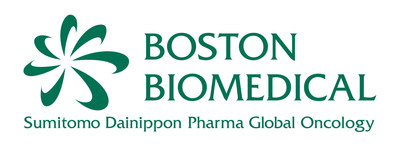Boston Biomedical Announces First Orphan Drug Designation For Napabucasin In Gastric/GEJ Cancer
CAMBRIDGE, Mass., June 23, 2016 /PRNewswire/ -- Boston Biomedical, an industry leader in the development of novel compounds designed to target cancer stemness pathways, announced that its lead investigational compound, napabucasin, has been granted Orphan Drug Designation from the U.S. Food and Drug Administration (FDA) in the treatment of gastric cancer, including gastroesophageal junction (GEJ) cancer. Napabucasin is an orally administered cancer stemness inhibitor designed to inhibit cancer stemness pathways by targeting STAT3, and is currently being investigated in a global Phase III clinical trial in combination with paclitaxel in patients with advanced gastric and GEJ cancer (the BRIGHTER study).

"This first Orphan Drug Designation for napabucasin is an important milestone for Boston Biomedical, as well as for patients with advanced gastric/GEJ cancer," said Chiang J. Li, M.D. FACP, President, CEO and Chief Medical Officer of Boston Biomedical, and the Head of Global Oncology for Sumitomo Dainippon Pharma Group. "In the U.S., only about 1 in 3 patients with gastric cancer survive five years after diagnosis, so there remains a significant need for innovation in this tumor type. We hope that napabucasin, with a first-in-class mechanism of action, will help address this significant unmet medical need."
The FDA's Orphan Drug Designation program provides special status and development incentives for drugs and biologics that are intended for the safe and effective treatment, diagnosis or prevention of rare diseases/disorders that affect fewer than 200,000 people in the U.S.i Each year, about 26,000 people in the U.S. are diagnosed with gastric cancer.ii
Phase Ib/II data for napabucasin in gastric/GEJ cancer were previously presented at the American Society of Clinical Oncology 2015 annual meeting; these data found that napabucasin and weekly paclitaxel can be combined in patients with advanced pre-treated gastric/GEJ cancer. Lesion regression, objective responses and prolonged stable disease were observed in heavily pre-treated patients. Common adverse events identified through this clinical trial included grade 1 or 2 diarrhea, nausea, fatigue, abdominal pain, vomiting and anorexia.iii
About Cancer Stem Cells
Cancer Stem Cells (CSCs) exhibit stemness the ability to self-renew and differentiate into heterogeneous cancer cells. This allows the CSCs to act like seeds, causing a patient's cancer to relapse or spread within the body.iv,v Evidence suggests that these cells possess resistance to conventional chemotherapy and radiation, so while such treatments can successfully shrink tumors, a population of CSCs may still survive.v,vi
Boston Biomedical is leading the biopharmaceutical industry in the development of novel compounds designed to target CSC pathways, with the goal of addressing stemness, an ongoing challenge in cancer treatment.
About Boston Biomedical
Boston Biomedical, Inc. (Founder, President, CEO and CMO: Chiang J. Li, M.D. FACP) was founded in November 2006 and is wholly owned by Sumitomo Dainippon Pharma Co., Ltd. Boston Biomedical's mission is to develop the next generation of cancer therapeutics by creating drugs designed to target cancer stem cell pathways. Boston Biomedical's innovation in drug discovery has received a number of recognitions and awards in the United States, including the Frost & Sullivan 2010 North American Drug Discovery Technology Innovation of the Year Award, the National Cancer Institute (NCI) cancer stem cell initiative grant award in 2010, and the 2011 Biotech Pioneer Award at the Alexandria Oncology Summit. The company also received the "Company To Watch" award in the 10th Annual Team Massachusetts Economic Impact Awards in 2013. Boston Biomedical is headquartered in Cambridge, Massachusetts, USA.
Additional information about the company and its product pipeline can be found at www.bostonbiomedical.com.
Disclaimer Regarding Forward-Looking Statements
The forward-looking statements in this document are based on management's assumptions and beliefs in light of information presently available, and involve both known and unknown risks and uncertainties. Information concerning pharmaceuticals (including compounds under development) contained within this material is not intended as advertising or medical advice.
For general inquiries:
Boston Biomedical
617-674-6800
For media inquiries:
Alicia Suter
CHAMBERLAIN PR
212-849-9448
alicia.suter@inventivhealth.com
i FDA. "Developing Products for Rare Diseases & Conditions". Accessed on June 22, 2016. Available at: http://www.fda.gov/forindustry/developingproductsforrarediseasesconditions/ucm2005525.htm
ii SEER. "SEER Stat Fact Sheets: Stomach Cancer". Accessed on June 22, 2016. Available at: http://seer.cancer.gov/statfacts/html/stomach.html.
iii Boston Biomedical. "BBI608-201: Phase 1b/2 study of cancer stemness inhibitor BBI608 combined with paclitaxel in advanced gastric and gastroesophageal junction (GEJ) adenocarcinoma." Accessed on June 22, 2016. Available at: http://www.bostonbiomedical.com/wp-content/uploads/poster_BBI608-201.pdf
iv Gupta PB, Chaffer CL, Weinberg RA. Cancer stem cells: mirage or reality? Nat Med.
2009;15(9):1010-1012.
v Ajani JA, Song S, Hochster HS, Steinberg IB. Cancer stem cells: the promise and the potential. Semin Oncol.
2015;42(suppl 1):S3-S17.
vi Jordan CT, Guzman ML, Noble M. Cancer stem cells. N Engl J Med.
2006;355(12):1253-1261.
Logo - http://photos.prnewswire.com/prnh/20150514/216131LOGO
To view the original version on PR Newswire, visit:http://www.prnewswire.com/news-releases/boston-biomedical-announces-first-orphan-drug-designation-for-napabucasin-in-gastricgej-cancer-300289418.html
SOURCE Boston Biomedical Pharma, Inc.

